In the heart of Cambodia lies a vast body of water that shrinks and expands greatly throughout the year — Tonlé sap (literally translated to ‘large fresh water river’). The name of this lake-and-river system is also commonly translated to ‘Great Lake’. In fact, it is so huge that its floodplain spans from Siem Reap to Phnom Penh and even farther. There are stilted or floating villages around the lake that tourists can visit. One of these is Chong Khneas (‘Chong Khnies‘ in Cambodian), a floating village which will generally be the subject of this blog post.
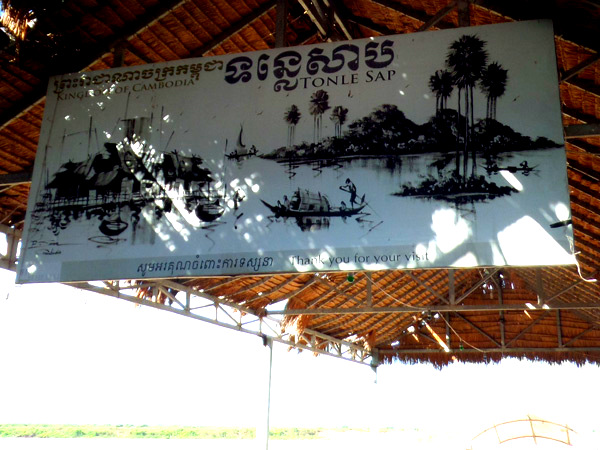
Don’t get me wrong though. I didn’t go on a solo trip to the Chong Khneas (and maybe I wouldn’t dare), which is the closest Tonle sap village from Siem Reap. Fortunately, I was with two good friends, Tala (Instagram: Kristal Vs World) and Dan (toploadingforlife.com). We were warned about a Tonle Sap Lake tour being a total rip-off. A lot of ‘Terrible’ reviews were also written about it on TripAdvisor but there were a handful of ‘Excellent’ ones, too. I think there’s also confusion among the reviewers of the definite scope of the Tonle Sap topic on that travel website. But for this blog, I will only focus on our Chong Khneas trip.
More Info: About Tonle Sap Lake and the Villages
[Image Re-use Terms & Conditions: The pictures featured on this blog post are resized (and edited) versions of the images owned by EthanLlemit.com and its owner. Re-using these photos for your blog is fine, but we request an attribution for them. Please use the text Tonle sap Lake Sights by Ethan Llemit with a link back to this blog post itself. An image copy with a higher pixel dimension or picture quality may also be provided upon request. Please use the website’s contact form for this matter. Thank you very much.]
Is This Trip For You?
The trip to the Chong Khneas floating village may not be for everyone. If you’re into tours that provide socio-economic learning or into eye-opening experiences on poverty and the likes, you may find this journey an interesting one. But with a boat ticket price of around 20USD to 30USD per person, I don’t think the tour was totally worth it. The price was based on travel reviews shared by tourists online. Our trip last November was part of a packaged tour (without a guide for the Tonle sap excursion) so we didn’t know if our tickets were paid for 20USD each. I just say that with what we experienced on this tour, the 20USD-ticket would totally be not worth it compared to the 40USD for a 3-day temple pass.
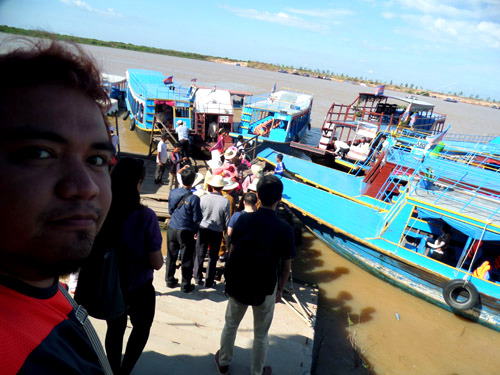
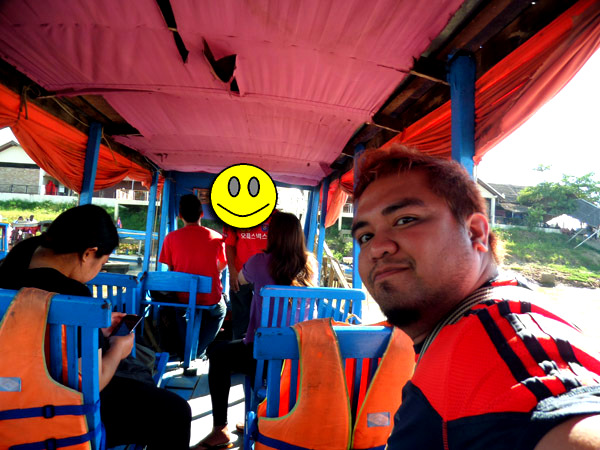
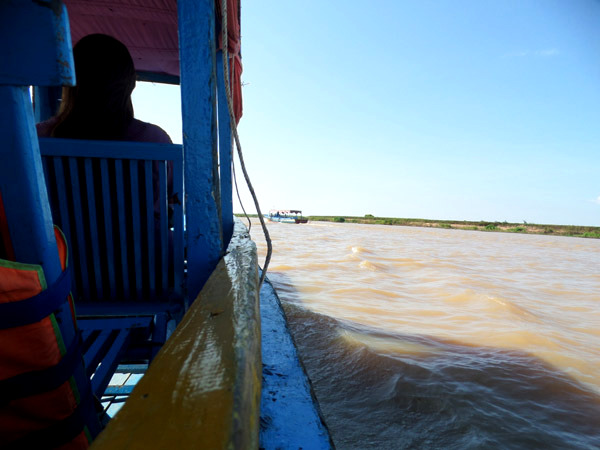
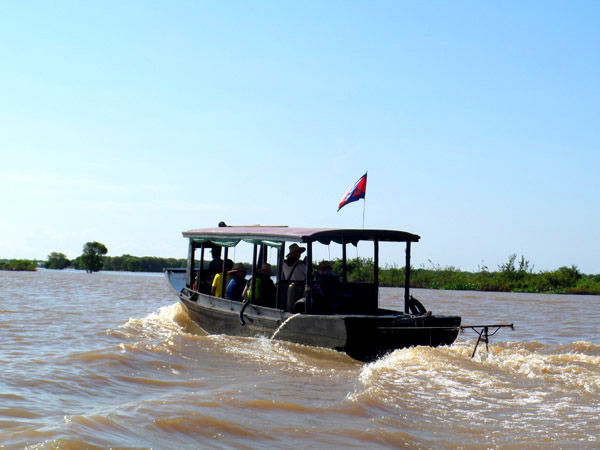
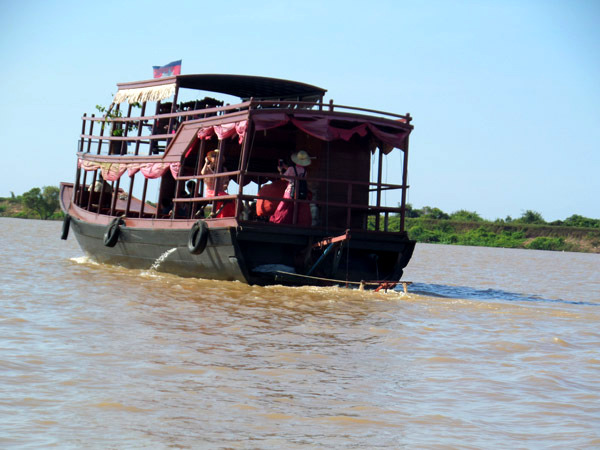
The Chong Khneas Village
If you’re like me who’s born and raised in the city and interested to see different lifestyles, a trip to this floating village can be an eye-opener for you. The houses are built on boats and other floating system, and it just amazes me how the residents got used to the seasickness they will experience day and night. There are also other floating establishments like schools, a church and general merchandise stores. You’ll be amazed at how people move from one place to another across the lake. If you’re lucky, you can get to see a vendor selling ice-cold refreshments and treat on her boat or perhaps a motorboat pulling a restaurant to another position on the waterway.
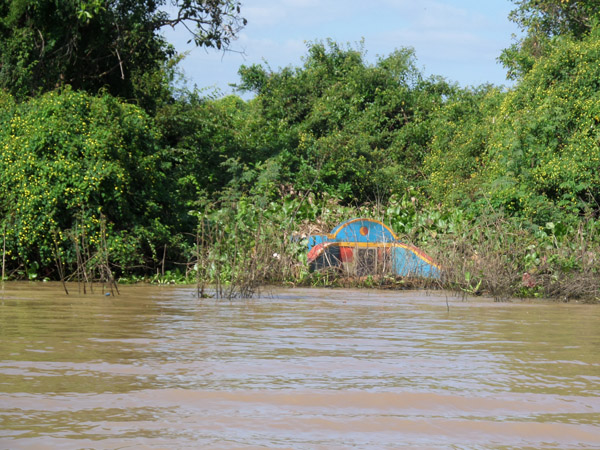
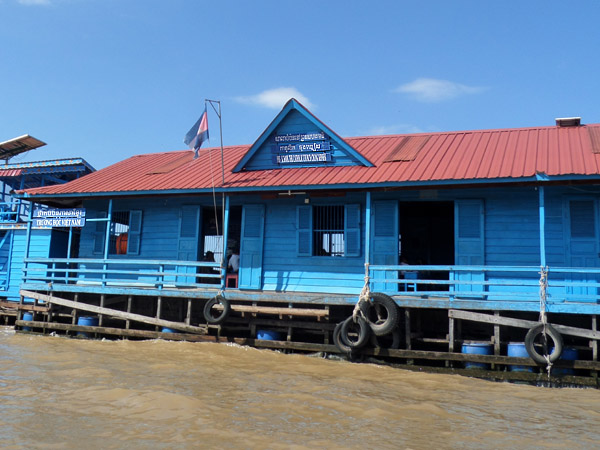
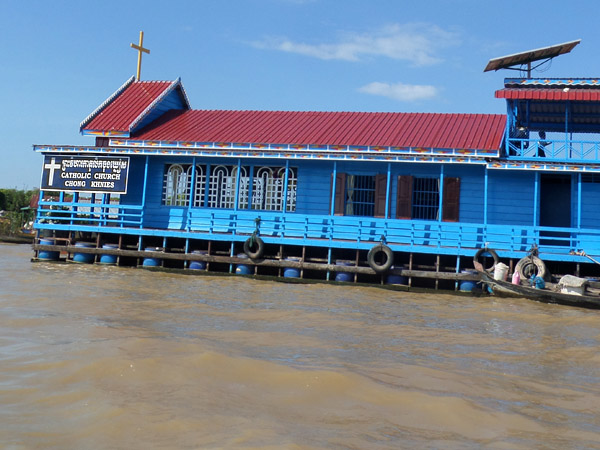
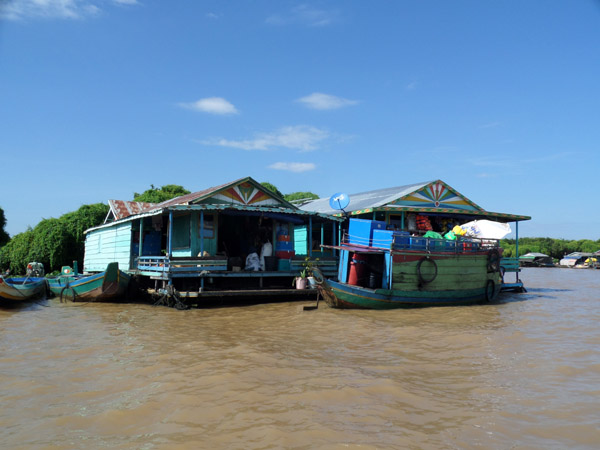
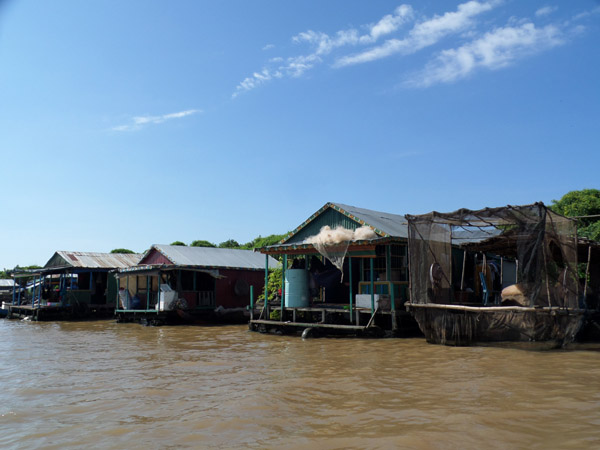
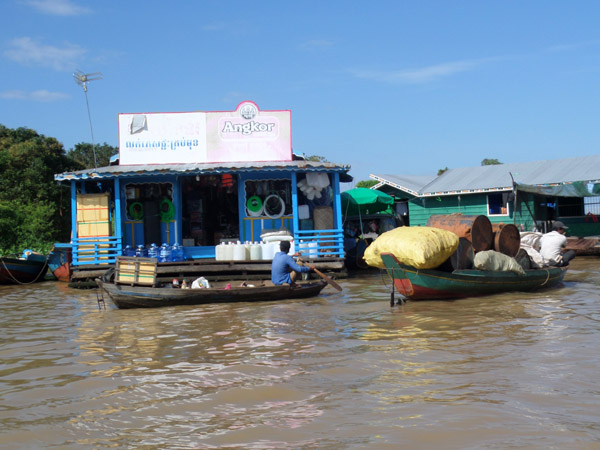
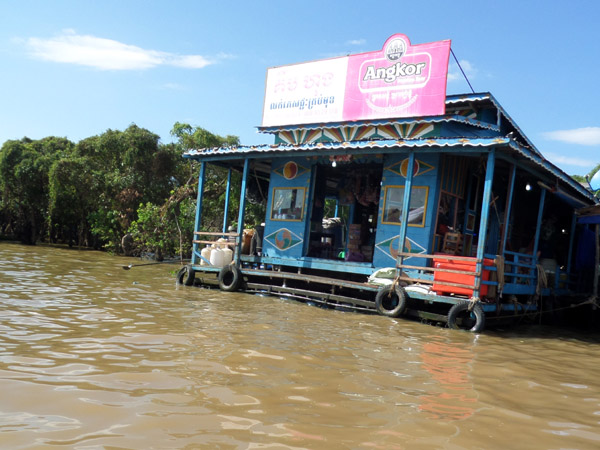
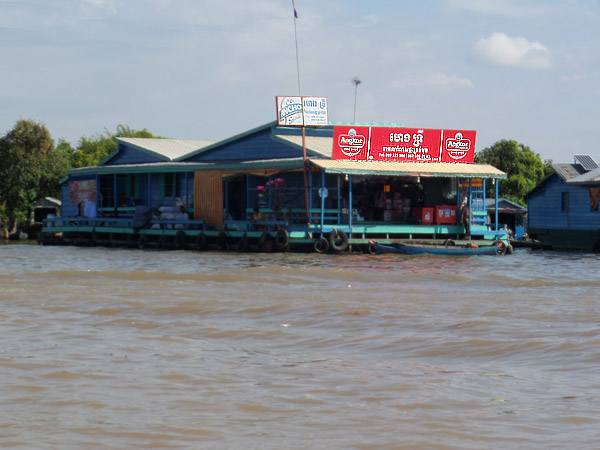
If my memory serves me right, the boatman told us that the homes and establishments change positions depending on the water level. It would be interesting though, being able to have a change of perspective in certain parts of the year. Environment-induced boredom can be alleviated. Yay!
But one couldn’t ignore the sight of poverty that the people of Chong Khneas village have to endure every day for most of their lives. If you’re familiar with the written characters on some floating buildings there, you will know that they’re a mix of Vietnamese and Khmer. True enough, our boatman shed light on this matter and told us that there are still ‘unofficial’ immigrants from Vietnam coming through the Mekong River and decided to stay in the village.
Cruising through the lake, you will get a glimpse of life in this floating village. You will get to see how fishermen prepare their fishes after they caught them. But I didn’t get to have a video on that though. The Tonle sap Lake plays an important role to the Cambodian economy as it is a major source of fishes exported to other countries. When water level is at its minimum, the floodplains are ideal for planting rice, which is another product exported by the country.
More Info: Economy of Cambodia, as compiled by Wikipedia
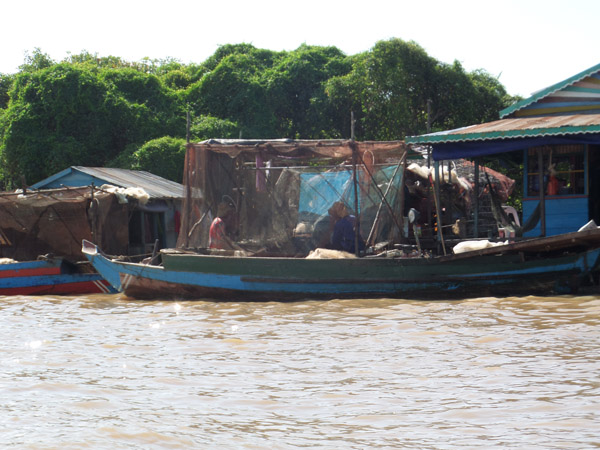
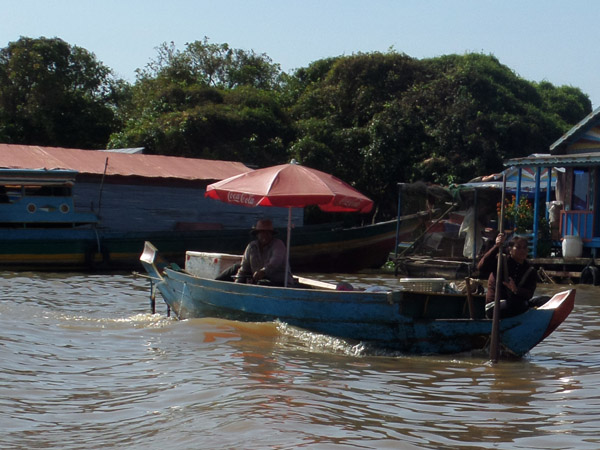
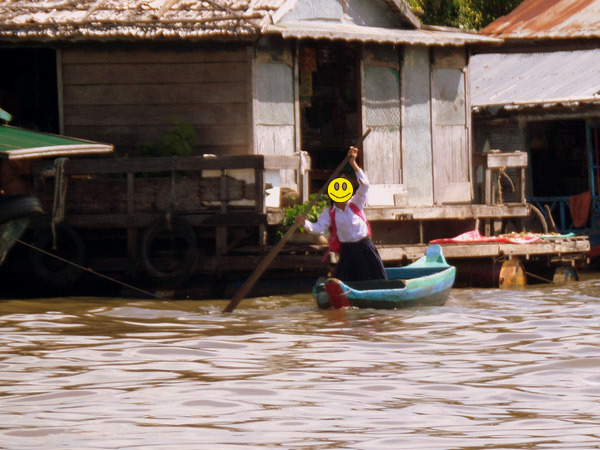
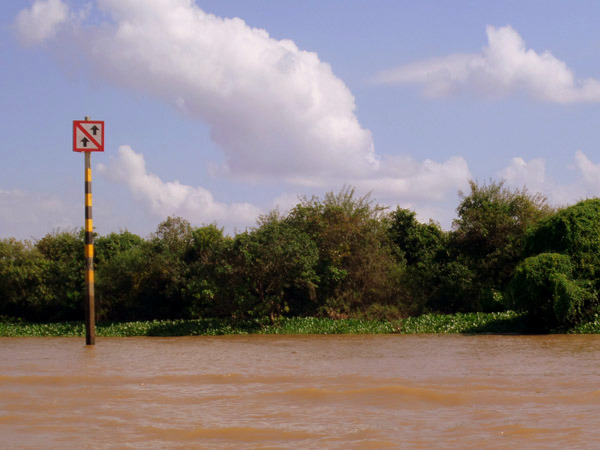
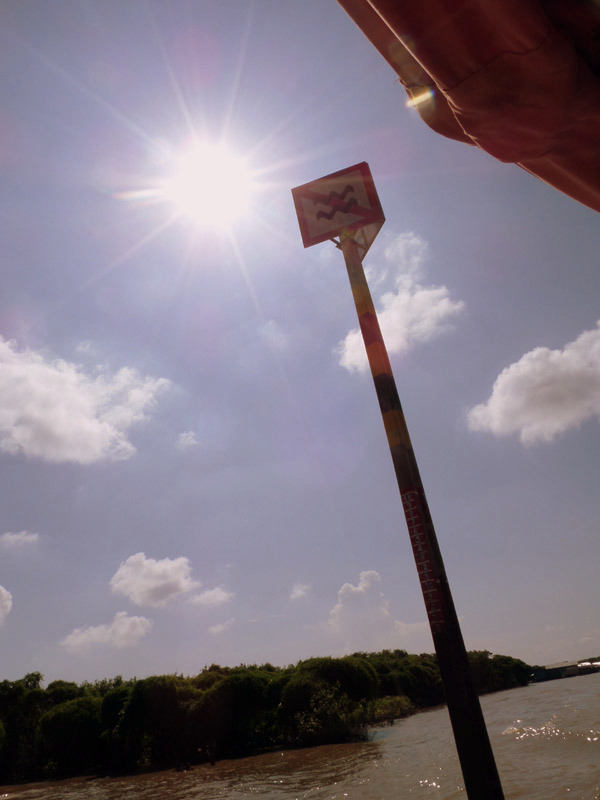
Fish Farm and Crocodile Farm
When it comes to Tonle Sap as part of a Cambodia tour package, you’ll generally be told about visiting a crocodile farm and fish farm. For me, it’s a big tourist trap! You’ll basically be brought to a souvenir shop built on the lake with a small area for baby crocodiles and another ‘pond’ for the fishes. Perhaps the only consolation for you being there would be the upper decks where you can take photos of the vast lake or the surrounding floating villages.
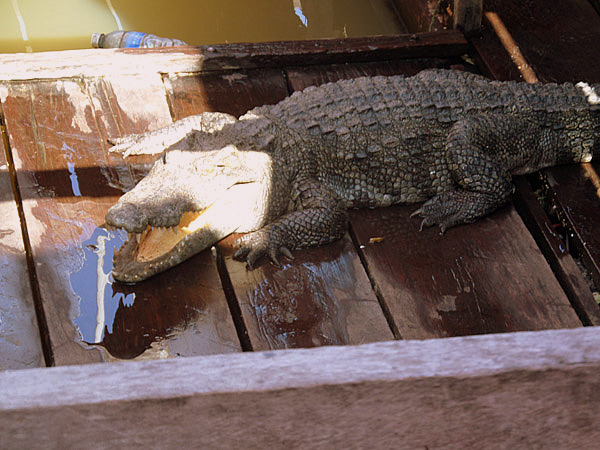
So if you’re going to Tonle sap Lake just because of the farms, forget it! Either we saw the right ‘farms’ or we were in the wrong place. Ooops?
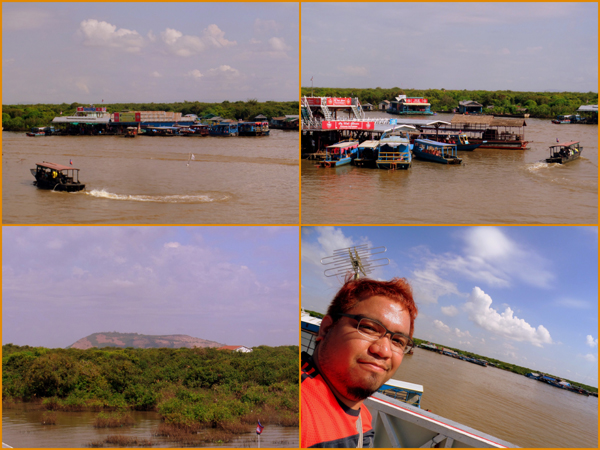
The Great Lake and ‘The Talk’
Prior to our trip to the lake, solo traveller Rhoda (now a travel blogger) had warned us about the tour being a rip-off. She told us about how the boatmen (or at least the ones on her boat) would talk about the poverty in the area and invite you to visit the orphanage with children who lost their parents while fishing. She also mentioned about the boatmen being persistent about making you buy one sack of rice from the floating market for these children. It would have been a noble move, but the price of sack there was around 40USD at the time of her trip. That’s much more expensive than the ones sold in markets around the city. And considering she’s travelling solo, 40USD is a huge chunk of her travel budget — not to mention the 30USD she paid for the boat.
We (together with my two travel buddies) visited Tonle Sap though, armed with Rhoda’s warning. We knew that there’s a possibility of having ‘The Talk’. Unfortunately, we weren’t prepared for how it was done. The boatmen stopped the boat in the middle of the lake as they prepared for ‘The Talk’, all the while we’re like ‘oh uh!’ It was scary with the boat coming to a full stop in the middle of the vast body of water that seems like a muddy sea. You can still see the water on the horizon! We were past the souvenir shop where we’re supposedly to be dropped off, and one of the boatman was saying ‘we’ll go to the lake first so you can take pictures’ to which we agreed. Picture-taking my arse-senic. There’s nothing picturesque in the area. It was scary! Well, at least for me. I suddenly realised I am agrophobic. Lolz.
In short, there was an implicit threat in our scenario. Either the boatmen weren’t aware with the threat they somehow created (and would just want to get some donation or something) or they really know about it (which could be really scary). But either way, the threat was there and real. I could just imagine how Rhoda and other solo travellers would feel at this moment, together with their boatmen.
Dani did most of the listening though. She’s our trip’s chosen spokesperson because Tala and I were too introverted to talk to other people. Haha. I did listen once in a while but my short attention span just couldn’t catch everything. If my ears and my memory served me right, I believe the boatman gave some good points (in fairness).
Don’t give the schoolchildren money especially when you take photos with them because that encourages begging
… or something he said like that.
It’s better to give donation directly to the ______ instead of buying souvenirs from the shop
… or something like that.
Donating directly is better than doing it through a charity online or government agency because it will benefit the children directly and doesn’t pass through red tape
… or something like that.
Donating to the teacher will have the chance that the donation will only go to the teacher’s pocket
… or something like that.
It’s good to explore the mangroves to know more about the community
… or something like that, and no mention of additional fees (yet).
I can’t really remember the concrete details mentioned during ‘The Talk.’ But it’s basically to entice tourists to buy the rice for the orphanage. Either that’s really a real thing (which I would say is noble if it’s true) or it’s a scam (for which I hope it wasn’t). I wasn’t in a position to tell if it was a scam or not. I leave it to your intuition should you want to experience ‘The Talk’ on the vast Tonle sap Lake. Hehe.
Thanks to Dani who have a clear, quick mind to tell the boatmen that our tour was a packaged deal by our guesthouse and the guys there had told us that ‘we don’t have to pay for anything anymore.’ So Dani told Mr. Boatman ‘we didn’t bring extra money.’ That was an excellent (and an honest one of course) statement to fend off any unreasonable fees that would possibly be extorted out of us. Yey!
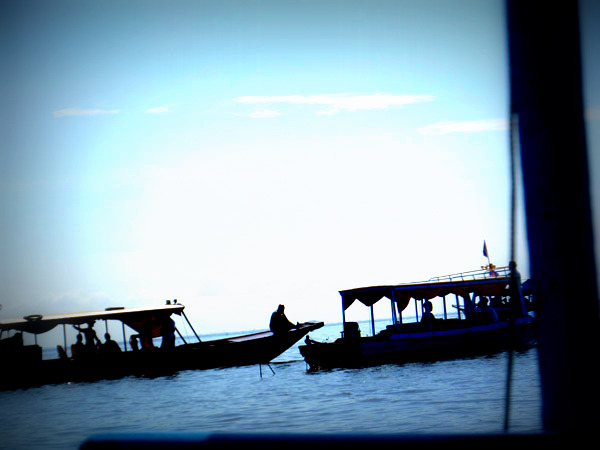
But hey, don’t be discouraged. I think we were just in the wrong boat. We had it to ourselves. I don’t know if they do the same with large groups booked by big tour companies, like the Taiwanese tourists had on another boat.
But then, I guess we’re lucky to be on the boat we were in. The ‘talking’ boatman wasn’t persistent about the donation or any additional fees (especially for the mangrove tour, which we didn’t take). I read a lot of TripAdvisor reviews from tourists about how they were forced to spend a lot of US dollars with the rice costing to as high as 50USD or how the entire ‘donation’ scheme is part of child exploitation activities. Some reviewers even say that they were forced to give the boatmen ‘mandatory’ tips. Either our boatmen were new at this scheme and couldn’t coerce us yet, or they’re really sincere with their plea. I won’t judge them though. But I do pray that their intention was pure, they probably aren’t just familiar with how to do it right.
Deep in my heart, I still want to believe that not all boatmen on the Tonle sap Lake are scheming.
I really don’t know. If I was rich (or at least financially prepared), donating a sack of rice for the orphanage would be noble thing to do, even if it costs a lot in the floating market where the high price was understandable though because of their distance from the city. But you will have to ask yourself if the rice would really go to the children? Won’t it be sent back to the store as the owners may possibly be part of the scam? I’d like to think that everything is for efforts to directly help the people at the floating village. But how can you be sure? How can you be sure that your good deeds will benefit the right people? The children?
Then, Tala, a techie person who is well-versed about the latest mobile phones, saw that the other boatman was using Galaxy Note 2. Hahaha. Okay na sana, eh! (Things would have already been right!)
So I leave the ‘charity’ decision to your instincts of whether you should donate or not while on a Tonle sap tour. It’s for you to decide, really.
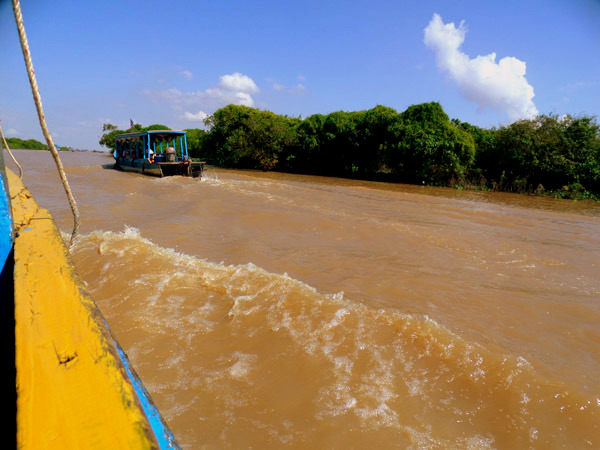
What Should a Solo Traveller Prepare For?
I wasn’t a solo trip on this one, but the experience is worth mentioning and sharing especially for lone travellers out there and especially after realising what Rhoda could have felt during her journey.
I guess if you followed through the verbose narrative of our experience, you will already have an idea of what to prepare for when planning a trip on the Tonle sap Lake alone. If I was doing a solo travel, I would completely strike this trip out from my list of things to do in Cambodia because aside from the reviews of scam (which I personally won’t be able to handle alone), the place is also far from the city centre.
If you’re more courageous than my introverted self, it doesn’t hurt to research on the trip and scrutinise the tourist reviews provided in many travel websites.
But if you’re feeling really adventurous and want to experience ‘The Talk’, just prepare for the money you will spend, from the essentials like the boat tickets to the worst-case scenario of donating overpriced sacks of rice (and giving the mandatory tips to the boatman who won’t accept 2USD based on Rhoda’s experience).
I won’t discourage you from putting this activity in one of your Cambodia tours if you feel like donating for the orphans in the villages on the Tonle sap Lake. I say it’s really a noble move. Children of deprived socio-economic societies do have a soft spot in my broken heart. Just make sure that your donations will benefit the right people. Other tourists and reviewers in TripAdvisor would have their own special ways for the children like providing them with pencils or something useful.
I also read in TripAdvisor that some tuktuk and taxi drivers are part of the scheme and thus, they will convince you to go visit the lake and would hook you up to scheming boatmen. As mentioned earlier, there are also ‘Excellent’ reviews, which essentially advise to book the trip with a reliable, trustworthy tour company in Cambodia.
I say, it’s better to be prepared than be put into an awkward scenario that could ruin your entire holiday.
Have you experienced this Tonle sap Lake tour? How was your experience? If you haven’t, do you still feel like going there and experience this thrilling scenario?
What advice can you give to a lone traveller when put into a situation with something as ‘The Talk’?
Share to us your stories and/or tips by dropping as a message in our comments. Thanks.


